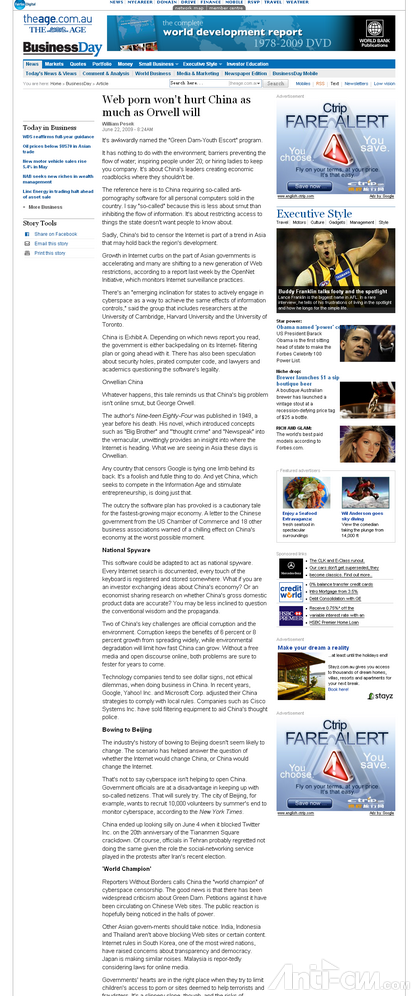|
|
本帖最后由 I'm_zhcn 于 2009-6-22 19:32 编辑
Web porn won't hurt China as much as Orwell will
http://business.theage.com.au/business/web-porn-wont-hurt-china-as-much-as-orwell-will-20090622-csvc.html
William Pesek June 22, 2009 - 8:24AM
It's awkwardly named the "Green Dam-Youth Escort" program.
It has nothing to do with the environment; barriers preventing the flow of water; inspiring people under 20; or hiring ladies to keep you company. It's about China's leaders creating economic roadblocks where they shouldn't be.
The reference here is to China requiring so-called anti- pornography software for all personal computers sold in the country. I say "so-called" because this is less about smut than inhibiting the flow of information. It's about restricting access to things the state doesn't want people to know about.
Sadly, China's bid to censor the Internet is part of a trend in Asia that may hold back the region's development.
Growth in Internet curbs on the part of Asian governments is accelerating and many are shifting to a new generation of Web restrictions, according to a report last week by the OpenNet Initiative, which monitors Internet surveillance practices.
There's an "emerging inclination for states to actively engage in cyberspace as a way to achieve the same effects of information controls," said the group that includes researchers at the University of Cambridge, Harvard University and the University of Toronto.
China is Exhibit A. Depending on which news report you read, the government is either backpedaling on its Internet- filtering plan or going ahead with it. There has also been speculation about security holes, pirated computer code, and lawyers and academics questioning the software's legality.
Orwellian China
Whatever happens, this tale reminds us that China's big problem isn't online smut, but George Orwell.
The author's Nine-teen Eighty-Four was published in 1949, a year before his death. His novel, which introduced concepts such as "Big Brother" and "'thought crime" and "Newspeak" into the vernacular, unwittingly provides an insight into where the Internet is heading. What we are seeing in Asia these days is Orwellian.
Any country that censors Google is tying one limb behind its back. It's a foolish and futile thing to do. And yet China, which seeks to compete in the Information Age and stimulate entrepreneurship, is doing just that.
The outcry the software plan has provoked is a cautionary tale for the fastest-growing major economy. A letter to the Chinese government from the US Chamber of Commerce and 18 other business associations warned of a chilling effect on China's economy at the worst possible moment.
National Spyware
This software could be adapted to act as national spyware. Every Internet search is documented, every touch of the keyboard is registered and stored somewhere. What if you are an investor exchanging ideas about China's economy? Or an economist sharing research on whether China's gross domestic product data are accurate? You may be less inclined to question the conventional wisdom and the propaganda.
Two of China's key challenges are official corruption and the environment. Corruption keeps the benefits of 6 percent or 8 percent growth from spreading widely, while environmental degradation will limit how fast China can grow. Without a free media and open discourse online, both problems are sure to fester for years to come.
Technology companies tend to see dollar signs, not ethical dilemmas, when doing business in China. In recent years, Google, Yahoo! Inc. and Microsoft Corp. adjusted their China strategies to comply with local rules. Companies such as Cisco Systems Inc. have sold filtering equipment to aid China's thought police.
Bowing to Beijing
The industry's history of bowing to Beijing doesn't seem likely to change. The scenario has helped answer the question of whether the Internet would change China, or China would change the Internet.
That's not to say cyberspace isn't helping to open China. Government officials are at a disadvantage in keeping up with so-called netizens. That will surely try. The city of Beijing, for example, wants to recruit 10,000 volunteers by summer's end to monitor cyberspace, according to the New York Times.
China ended up looking silly on June 4 when it blocked Twitter Inc. on the 20th anniversary of the Tiananmen Square crackdown. Of course, officials in Tehran probably regretted not doing the same given the role the social-networking service played in the protests after Iran's recent election.
'World Champion'
Reporters Without Borders calls China the "world champion" of cyberspace censorship. The good news is that there has been widespread criticism about Green Dam. Petitions against it have been circulating on Chinese Web sites. The public reaction is hopefully being noticed in the halls of power.
Other Asian govern-ments should take notice. India, Indonesia and Thailand aren't above blocking Web sites or certain content. Internet rules in South Korea, one of the most wired nations, have raised concerns about transparency and democracy. Japan is making similar noises. Malaysia is repor-tedly considering laws for online media.
Governments' hearts are in the right place when they try to limit children's access to porn or sites deemed to help terrorists and fraudsters. It's a slippery slope, though, and the risks of overreach and economically damaging censorship are real. Go too far and Asia's future will be truly Orwellian.
Bloomberg

|
China, hurt, Orwell, Will, won, China, hurt, Orwell, Will, won, China, hurt, Orwell, Will, won
评分
-
1
查看全部评分
-
|